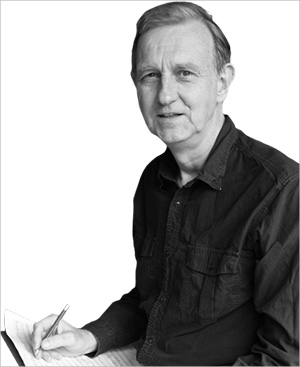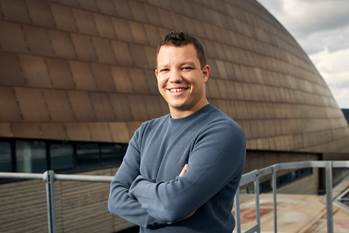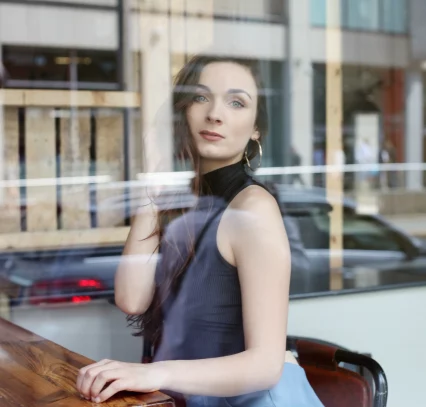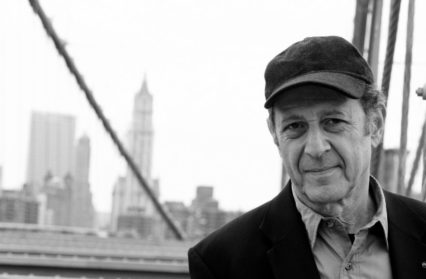Nigel Jarrett was at Hoddinott Hall, Cardiff, to hear the BBC National Orchestra of Wales on the opening day of the 50th Vale of Glamorgan Festival 2019 of contemporary music.
How music gets written and performed today might not be obvious from the Vale of Glamorgan Festival’s grand opening night concert. As artistic director John Metcalf sees it, the symphony concert element is important in giving composers an imposing, even awe-inspiring, platform for new work. They may be writing music these days that deliberately eschews the gargantuan, as was seen earlier in the day when music by no fewer than ten composers, several of them Welsh, was ‘played’ by a Dutch Street organ called Astrid from the collection owned by Francis Stapleton near Bala. Each piece was technically a ‘world première’, a term usually connoting the idea that the world should take notice. And perhaps it should if only for the illustration that composers can get by without meeting the ultimate challenge of writing for a large orchestra.

But there’s more to it. Metcalf believes that the appearance of the BBCNOW at the festival gives it and contemporary music generally a cachet that prevents their being viewed as ‘ghettoised’ and limited by resources. There’s a further difficulty: having put the orchestra in place, programming for it is problematic in that there is so much music to choose from. ‘The heart-searching was more acute this year, our 50th,’ Metcalf said. ‘To what extent did we reflect past achievements or, rather, look firmly to the future?’ The decision was made to forgo the listing of a few extended works in favour of an anniversary celebration of music by composers associated with the festival and younger emerging ones.
The result was a ‘gala’ night of contemporary music and, more than that, of music written by living composers. ‘Gala’ and ‘contemporary’ in terms of serious music might seem like a contradiction, the image of hundreds flocking in posh suits and frocks to celebrate the here and now of ‘classical’ music seeming a bit optimistic. More’s the pity. The music performed at this festival opener was uplifting, if veering heavily towards what by the 1990s Metcalf saw as developments appealing to a wider cross-section of the public. Use any adjective that applies.

Whatever the means and manner of commissioning new work, it’s often brief, as at this concert where the BBCNOW was conducted confidently by award-winning American newcomer Ryan Bancroft. The exception was the Wales première (a not insignificant boast for a Welsh festival) of Music for Ensemble and Orchestra by Steve Reich, whose work has been played often at Vale of Glamorgan and who is this year’s festival patron. The work represents large-scale Reich minimalism thirty years on. It’s more opaque but no less joyous, though the insistent pulse is now driven against a certain militating density as the music refers to the concerti grossi of J.S.Bach (in this case the Brandenburg No. 5). But events and episodes focus on sections of the orchestra without, in a serious reflection of Bach, un-hitching themselves from the overall propulsion.
As in his Baroque forebear, Reich weds a concertino (keyboards, vibraphones, winds, brass, strings, and electric bass in pairs) with a larger string ripieno. Moreover, what we get at the end has grown out of predecessing music, not always the case with composition travelling a straight line and much internal division and layering. Reich has put on weight musically and for an octogenarian that’s allowed. The problem is that his kind of smiling minimalism won’t stand too much late gravity. He’s not about to re-invent himself. Bancroft kept it all under control except towards the very end, where there was minor and short-lived loss of synchronicity.
In spite of factors which limit the scope and ambition of new commissions, there remains the problem of substance. Audiences might feel cheated of length as indicated by formal development that takes time. One solution for a composer is high-voltage truncation, as in Descent, a festival commission and thus world première by the Cardiff-based composer Mark David Boden. Its three-part structure would blur if it were not for a less breathless middle section and the composer’s skill in allowing soloists to make valid contributions.
But robustness and exuberance are Boden watchwords and, encapsulated on a small scale, they are electrifying. They were too, if allowed greater extension, in the European première of American Ben Wallace’s Five Gifts for an Old Friend, at times the musical equivalent of a speeded-up pin-ball machine. Wallace, with heart on sleeve and elsewhere, and in mischievous mood, scarpers through variants on a tune he’d written for a friend’s birthday. It incorporates, in no particular sequence, a lot of his creative desiderata. In this piece at least, which always sounds like a Tom & Jerry film score, he is a Jeff Koons of contemporary music, but elsewhere in his work, which includes re-mixing for video games, he is anything but.
The skill and rhythmic convolution and unpredictability of this writing were matched by the orchestra in dealing with it. But, then, this is the BBCNOW, which for years has been putting itself about beyond the concert hall. Wallace, like other composers featured, was present and, receiving the applause afterwards, was visibly moved by the reception.
Soprano Elizabeth Donovan stepped forward with violinist Tamsin Waley-Cohen for the world première of Metcalf’s Polly Garter’s Aria, the centrepiece of his opera Under Milk Wood after Dylan Thomas. Metcalf’s re-visit and re-cast for larger orchestral forces, with the violin’s obbligatomode functioning as Polly’s steadying familiar, might have tempted him to gild the lily. His experience told him, on the contrary, to uphold and solidify the character’s good nature at the expense of her reputation as a woman no better than she ought to be. Before it, Donovan and Waley-Cohen performed with the orchestra American David Lang’s Simple Song#3, the rather banal finale to Paolo Sorrentino’s film Youth, about a composer, played by Michael Caine. In the film the song is sung by Sumi Jo and is risibly advanced as the Caine character’s most famous work. Lang, who’s won a Pulitzer Prise for music, once taught Ben Wallace. It was tempting to compare Lang’s song with Metcalf’s. No comment.
In Blue Lab, named after the jazz duo Blue Lab Beats, Claire Victoria Roberts wrestles interestingly with contradictory elements, such as how music with a tonal centre can be made to sound fresh and new. It’s a laudable aim in music history where tonality and atonality have set up divisions which on paper are irreconcilable. Some might ask why they should be, except to make what is anathema to some ears more acceptable. Such considerations, however, seem incidental to Roberts’s success in transforming jazz and funk licks into music with mood and muscle.

Tradition also pervades Dobrinka Tabakova’s Organum Light, performed here in its string quintet scoring by the BBCNOW as a chamber orchestra. It had been heard twice at previous festivals in other arrangements. The music strives for the same accommodations as Roberts’s piece but arrives at a different conclusion. Both give due weight and significance to the influences which inspire them. Tabakova, Reich, Pëteris Vasks and Graham Fitkin are big names in contemporary music.
Vasks’s serenely beautiful Vientulais Engelis, a meditation for violin and strings, was performed with grace, restraint and almost painful quietude by Waley-Cohen in keeping with its marriage of spiritual and temporal, the latter embodied in the composer’s ‘Green’ credentials. In contrast, Fitkin’s popular Metal, incorporating scaffolding pipe as a percussive element, ducked, dived and looped in pursuit of its elements, which are unrestrained energy, firepower and flinty resistance.
Six of the nine composers took their bows at the end of the concert with Bancroft, who’d negotiated some difficult scores. With an orchestra as versatile as the BBCNOW, such contemporaneity sounded even more worthy of a wider audience.
Nigel Jarrett is a freelance writer and critic. He’s a regular contributor to Wales Arts Review on music and other subjects. He won the Rhys Davies Prize and the Templar Shorts Prize for short fiction, and he’s represented in the Library of Wales’s anthology of 20th– and 21st-century short stories.



 Enjoyed this article? Support our writers directly by buying them a coffee and clicking this link.
Enjoyed this article? Support our writers directly by buying them a coffee and clicking this link.







